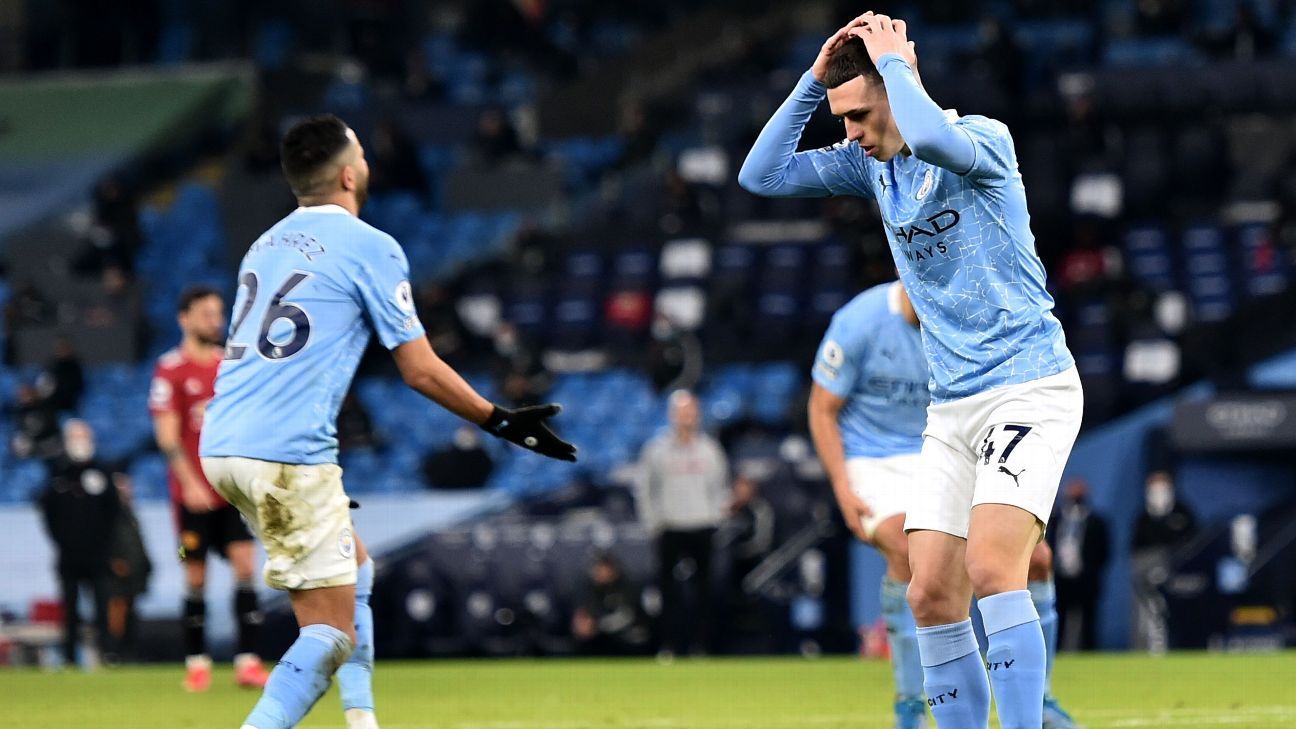Products You May Like
Breaking news: Manchester City are human after all! They can be beaten, as their bitter local rivals United proved with a 2-0 victory at the Etihad on Sunday. But does that mean Pep Guardiola’s team drops out of the conversation about the Premier League‘s greatest-ever teams? Not necessarily. A Rolls Royce still runs like a dream even if it gets a scratch on the back door, doesn’t it?
City’s run of 21 successive wins and 28 games unbeaten in all competitions was astonishing, even if it was ended by a combination of their own sloppiness, some excellent United defending and some lethal counter-attacking play. The defeat was no fluke, but City remain a magnificent and expertly coached team — and you certainly wouldn’t want to be next to face them.
They have been fluent, graceful and dominant. They have hogged possession and had barely gave opponents a look-in… until Sunday. The fact that Guardiola has barely called upon the club’s all-time top scorer, Sergio Aguero, opting to mostly use a “false No. 9” (and occasionally Gabriel Jesus) is just another reminder of the innovative mind of this obsessive, perfectionist coach.
– Stream ESPN FC Daily on ESPN+ (U.S. only)
– ESPN+ viewer’s guide: Bundesliga, Serie A, MLS, FA Cup and more
Yet their run was bound to end somewhere. By the law of averages, a day will come when things don’t run the way of even the most accomplished teams. That is why Arsenal‘s unblemished 2003-04 season still stands as arguably the Premier League’s No, 1 achievement. That side only totalled 90 points, winning 26 and drawing 12. By the closing stages of that season, the players knew that every opponent wanted to be the team to end their unbeaten run. Ultimately, none did.
One of those “Invincibles,” Ray Parlour, said recently of their historic season: “I remember we were absolutely out on our feet. Every team that played us was treating it like a cup final. We went to Portsmouth, and we got battered. We should have lost 5-1, but somehow, we dredged up a draw. That’s what top teams do.”
Manchester United‘s treble-winning team of 1999 (Premier League, FA Cup and Champions League) is another to throw into the argument regarding the best Premier League squad of the modern era. That team had Andy Cole, Dwight Yorke, Teddy Sheringham and Ole Gunnar Solskjaer to call upon in attack, not to mention a great goalkeeper in Peter Schmeichel, and midfield masters like Roy Keane, Paul Scholes and David Beckham. Those illustrious names sprinkle an awful lot of stardust, but the fact is they won the title with a very modest 79 points, suggesting it was hardly a vintage edition. Of course, there were other fine United teams among Sir Alex Ferguson’s 13 title winners, especially when the maverick brilliance of Eric Cantona was on show.
Jose Mourinho’s first Chelsea team in 2004-05 was built on a wonderful defence constructed around John Terry and Ricardo Carvalho, but people tend to forget that outfit also had the flair of flying wingers Arjen Robben and Damien Duff, along with a finisher like Didier Drogba. They took a lot of beating and also belong in any conversation about the “best ever.”
Former Manchester United player turned TV pundit Gary Neville always identifies the Arsenal team of 1998 as the hardest he played against: “They could beat you a lot of ways. They had the talent of Ian Wright, [Dennis] Bergkamp, [Marc] Overmars, and the rest, and you could never bully them either with Patrick Vieira and Emmanuel Petit and Tony Adams in there.”
Comparing eras is very difficult because the game evolves and is played in different environments.
Former England defender Danny Mills says: “This current Man City team would hammer nearly every team that ever played if all games were played in this era. They’re that good. But even 10-15 years ago, the game was so much more physical. They would have got kicked off the park. Nowadays you can’t tackle. I got sent off seven times. If I was [playing now] it would be 77! Back then, they could not have played like they can now, pinging all those passes around.”
You could argue, too, that it’s too early to be putting this City team’s name up in lights, even if an unprecedented “quadruple” of Premier League, Champions League, FA Cup and Carabao Cup is still firmly on the table. Until the trophies are in the bank, this team must wait its turn to be ranked above even other City title winners, especially the one that amassed a record 100 points three seasons ago. Yet all things are still possible in this curious season of “ghost games” which must go down with an asterisk against it, so strange has the environment been with temperature guns, face masks and empty stadiums.
It has been extraordinary that City — badly hit by a rash of positive COVID-19 tests in mid-December — put together the run they did, especially as the manager revealed last week: “I sat and watched us play West Brom, a 1-1 draw, and I thought ‘I don’t like my team.’ We needed to be calmer, to think more and not run everywhere.
“I sat with the coaches, and we decided to go back to [basics]. Lots of width, and to maybe surprise opponents by pushing Joao [Cancelo] and Alex [Zinchenko] inside to get more numbers into central midfield, and then to be calm, and let the talent of the players take over.”
Of course, there’s one element that makes this City side much meaner than some of the free-scoring, but defensively shaky, previous editions: Ruben Dias. Since arriving from Benfica, his partnership with a revitalised John Stones has so far conceded five goals in 17 matches together. This is the most secure City have probably ever looked in the modern era, even eclipsing the Vincent Kompany teams. Guardiola is thankful: “Ruben plays every match like it’s the last one. He not only plays his game, he makes all the others better too.”
That much-improved defending is what makes this season’s City far more difficult to beat, and it also gives them a much bigger chance in the Champions League, which is surely the “unfinished business” Guardiola was referring to when he signed a new contract to stay in England.
“I love to train in the Shakespeare country, the Beatles country, the Oasis country. It is not just the football, it is special here,” he says.
Having a team this gifted helps as well. How they last the pace of this bizarre and demanding season might be crucial. They did look just a little jaded at the end of the United derby defeat.
But only when the season ends can we truly judge where they stand in the pantheon of great Premier League teams.

